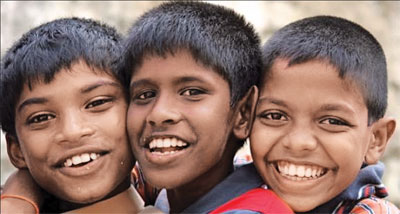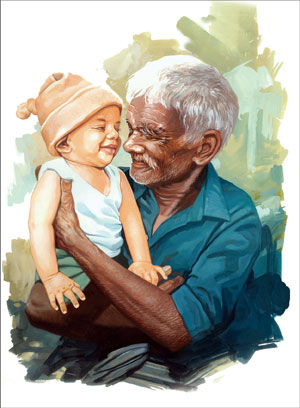|
Sri Lanka celebrates Children’s Day and International
Day of Older Persons:
Children and elders deserve a better deal
Tomorrow is a special day for all you
children out there. October 1 is the day when Sri Lanka celebrates
Children’s Day. It is also when the International Day of Older Persons
is commemorated around the world. Sri Lanka would be organising many
events to mark the twin occasions.
If a child is given love, he becomes loving ... If he’s helped when
he needs help, he becomes helpful. And if he has been truly valued at
home … he grows up secure enough to look beyond himself to the welfare
of others.
- Dr. Joyce Brothers
(Good Housekeeping, August 2010)
Stay a child while you can be a child.
-Stephen Sondheim
(Into theWoods)
Nothing you do for a child is ever wasted.
– Garrison Keillor
(Leaving Home)
The brightest light, the light of Italy, the purest sky of
Scandinavia in the month of June is only a half-light when one compares
it to the light of childhood. Even the nights were blue.
- Eugene Ionesco
(Present Past / Past Present)
Children and elders are polar opposites, but the world will be a much
duller place without them. They make the world more beautiful, more
vibrant. We all are first children and then become adults, but we can
never forget the joys of childhood. A joyous childhood, unfortunately,
is not a reality for most children in the world today. They are
subjected to untold hardships from birth onwards and millions of
children in the Third World do not even live until they are five years
old. Children in the developed world, however, have the best of
everything and issues such as obesity have become major problems in
those societies. The elderly too have their own problems. Thanks to
developments in healthcare, most people can live to a ripe old age with
certain conditions and diseases, which once proved to be fatal, being
easy to treat now.

This has however turned into a problem for most countries i.e. how to
care for a greying, non-productive population. Sometimes referred to as
‘population ageing’ this is a problem that many countries are grappling
with.
Our thoughts and actions on children and elders should not be limited
to October 1. There are things we can do at individual level against the
exploitation of children and older persons. Parents, teachers and
religious leaders must also guide children on the correct path. Children
and elders around the world deserve a better deal, not just tomorrow,
but every day of the year.
Children’s Day around the world
The Children’s Day is celebrated on different days in many places
around the world. International Children’s Day is celebrated on June 1
while Universal Children’s Day is on November 20. Sri Lanka celebrates
Children’s Day on October 1.
The International Children’s Day had its origin in Turkey in 1920 and
later in the World Conference for the Well-being of Children in Geneva,
Switzerland in 1925. The reason for selecting June 1 as International
Children’s Day is not clear: one theory is that the Chinese
Consul-General in San Francisco (USA) gathered a number of Chinese
orphans to celebrate the Dragon Boat Festival in 1925, which had fallen
on June 1 that year, and also coincided with the conference in Geneva.
Children’s Day was first celebrated worldwide in October 1953, under the
sponsorship of the International Union for Child Welfare in Geneva. The
idea of a Universal Children’s Day was adopted by the United Nations
General Assembly in 1954 to protect children working long hours in
dangerous circumstances and allow all children access to an education.
The event takes place on November 20 every year and was established
to encourage all countries to institute a day, firstly to promote mutual
exchange and understanding among children and secondly to initiate
action to benefit and promote the welfare of the world’s children. It
was also chosen as the day to celebrate childhood. November 20 is also
the anniversary of the day the UN General Assembly adopted the
Declaration of the Rights of the Child in 1959.The Convention on the
Rights of the Child was then signed on the same day in 1989, which has
since been ratified by 191 states.
 Universal
Children’s Day is currently observed on November 20 in more than 100
countries. International Day for the Protection of Children, observed in
many countries as Children’s Day on June 1 since 1950, is said to have
been set up by the Women’s International Democratic Federation during
its November 1949 congress in Paris. Universal
Children’s Day is currently observed on November 20 in more than 100
countries. International Day for the Protection of Children, observed in
many countries as Children’s Day on June 1 since 1950, is said to have
been set up by the Women’s International Democratic Federation during
its November 1949 congress in Paris.
International Day of Older Persons
The UN International Day of Older Persons is celebrated annually on
October1 to recognise the contributions of older persons to society and
to examine issues that affect their lives. The theme this year is
‘Longevity: Shaping the Future’.
It is a special day for older persons or senior citizens all over the
world. In many countries events that focus on senior citizens are
conducted at this time of the year while the media also highlight
various issues facing the elderly and discuss contributions they have
made to create a better society.
The World Health Organization (WHO), which is the UN’s directing and
coordinating authority for health related issues, and other groups have
been actively involved in promoting public awareness and attention on
the International Day of Older Persons.
Discussions are centred on topics such as ageing populations and the
provision of adequate healthcare for aged persons; volunteer work;
social care; and ways to be more inclusive of older persons in the
workforce.On December 14, 1990, the UN General Assembly declared October
1 as the International Day of Older Persons, following up on initiatives
such as the Vienna International Plan of Action on Ageing, which was
adopted by the 1982 World Assembly on Ageing and endorsed later that
year by the Assembly. The International Day of Older Persons was
observed for the first time throughout the world on October 1, 1991.
In 1991 the UN General Assembly adopted the United Nations Principles
for Older Persons. In 2002 the second World Assembly on Ageing adopted
the Madrid International Plan of Action on Ageing to respond to the
opportunities and challenges of population ageing in the 21st century
and to promote the development of a society for all ages.
Convention on the Rights of the Child
The United Nations Convention on the Rights of the Child (UNCRC) is a
human rights treaty setting out the civil, political, economic, social,
health and cultural rights of children. The Convention defines a child
as any human being under the age of 18, unless specified differently by
the domestic legislation of states.
Nations that ratify this convention are bound to it by international
law. Compliance is monitored by the UN Committee on the Rights of the
Child, which comprises members from different countries. Once a year,
the Committee submits a report to the Third Committee of the UN General
Assembly, which also hears a statement from the UNCRC Chair and the
Assembly adopts a Resolution on the Rights of the Child. Governments of
countries that have ratified the Convention are required to report to,
and appear before, the United Nations Committee on the Rights of the
Child periodically to be examined on their progress with regards to the
advancement of the implementation of the Convention and the status of
child rights in their country.
Their reports and the committee’s written views and concerns are
available on the committee’s website. The UN General Assembly adopted
the Convention and opened it for signature on November 20, 1989 (the
30th anniversary of its Declaration of the Rights of the Child) in New
York. It came into force on September 2, 1990, after it was ratified by
the required number of nations. Currently, 193 countries are party to
the Convention, including every member of the United Nations except
Somalia and the United States and the new nation of South Sudan. Somalia
had announced in late 2009 that it would eventually ratify the
Convention. The Convention deals with child-specific needs and rights.
It requires states to act in the best interests of the child. This
approach is different from the common law approach found in many
countries that had previously treated children as possessions, ownership
of which was sometimes argued over in family disputes.
The Convention acknowledges that every child has certain basic
rights, including the right to life, his or her own name and identity,
to be raised by his or her parents within a family or cultural grouping,
and to have a relationship with both parents, even if they are
separated. The Convention obliges states to allow parents to exercise
their parental responsibilities.
It also acknowledges that children have the right to express their
opinions and to have those opinions heard and acted upon when
appropriate, to be protected from abuse or exploitation, and to have
their privacy protected, and requires that their lives not be subject
toexcessive interference. The Convention also obliges signatory states
to provide separate legal representation for a child in any judicial
(legal) dispute concerning their care and asks that the child’s
viewpoint be heard in such cases. The Convention forbids capital
punishment for children. |


